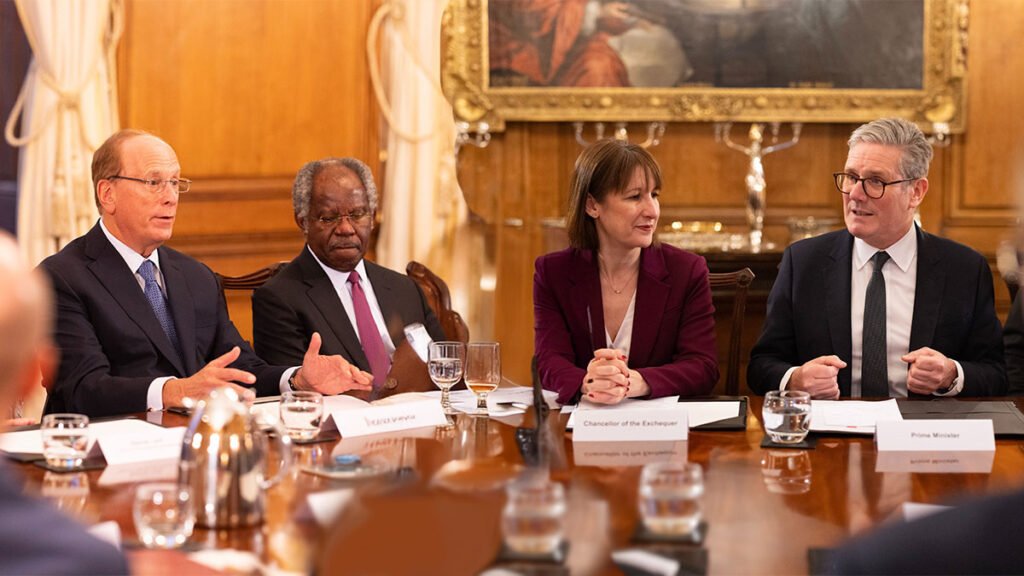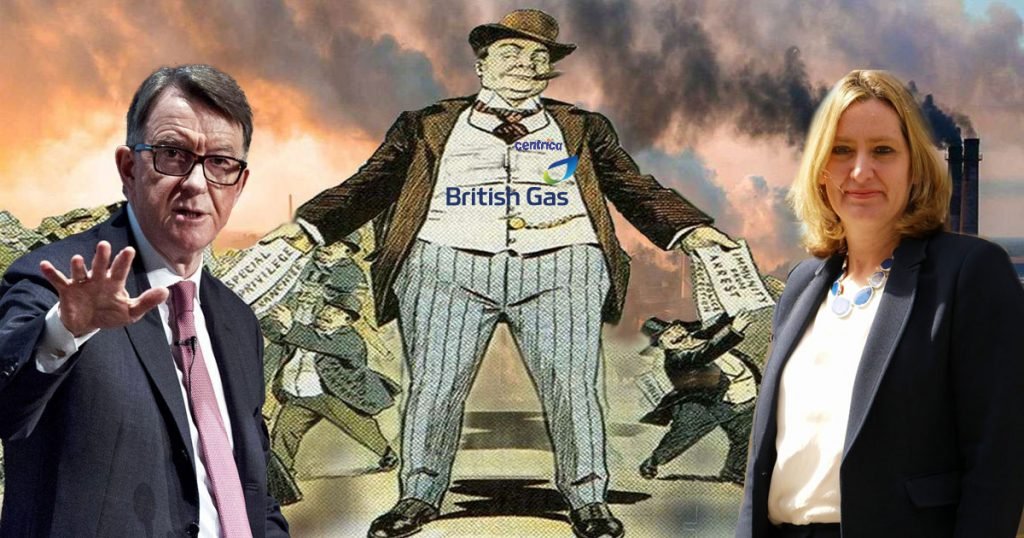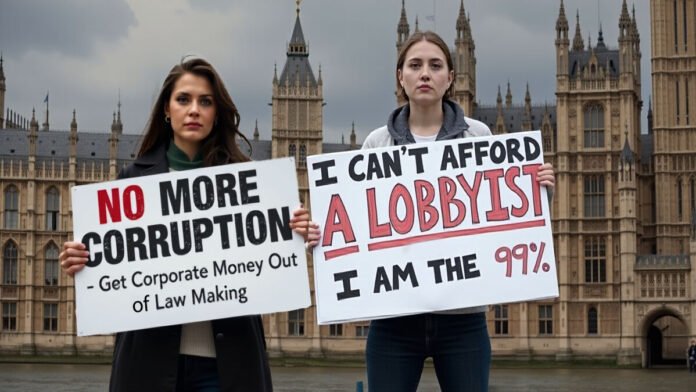From Public Service to Corporate Servitude: How Britain’s Government Serves Big Business
Ask this government a simple question: Who do you serve?
They’ll offer the usual platitudes—“the British people,” “working families,” “hardworking taxpayers.” But in a moment of rare candour that should alarm anyone who cares about democratic governance, Treasury Minister Lord Livermore laid bare an uncomfortable truth: Britain’s government now openly positions itself as a facilitator for corporate interests rather than a representative of its people.
Speaking to an audience of 700 corporate lobbyists—representing banks, arms manufacturers, pharmaceutical giants, and energy companies—Livermore didn’t just acknowledge their influence; he celebrated it. These lobbyists and their clients, he declared, are a “huge and important part” of the government’s plans.
The message couldn’t be clearer: in modern Britain, policy is no longer shaped by public need but by corporate demand.
This wasn’t a closed-door confession but a webinar—the first in a series designed to embed corporate interests even deeper into the machinery of government. The guest list reads like a who’s who of corporate influence: representatives from tech behemoths, energy giants, and consulting firms, alongside lobbying powerhouses like Hanbury, Headland, Lexington, Brunswick, Cavendish, and Grayling.

The government’s agenda, as outlined by Livermore, is striking in its servility to business interests. “Growth comes from business, not the government,” he insisted, positioning the state not as a driver of national development but as a mere enabler of corporate ambition. His focus on eliminating “stifling regulation” and “removing barriers to growth” transforms public protections into corporate inconveniences.
Open Democracy’s Ethan Shone attended the webinar, where he recorded Livermore wax lyrical in his exclusive article, saying:
“Livermore talked up the recent ousting of the head of the competitions regulator and his replacement with a former Amazon executive as evidence that the government is taking seriously its deregulatory agenda.
He also mentioned the recent push for regulators to submit proposals for growth and said Labour’s National Wealth Fund will “help catalyse private investment into sectors where at the moment, perhaps there’s a too high degree of risk”.
“We can use the National Wealth Fund to help derisk some of those investments,” said the minister. Economists describe this process as the state stepping in to improve the private returns on infrastructure assets.”
The minister’s words – “Growth comes from business, not the government” – reveal a stunning abdication of responsibility. This isn’t mere collaboration with the private sector; it’s the outsourcing of democracy itself. When Lord Livermore speaks of “removing barriers to growth,” what he really means is dismantling the regulatory frameworks that protect workers, consumers, and our environment.

The appointment of a former Amazon executive to head the competition regulator wasn’t presented as a potential conflict of interest but as a triumph of deregulation. The National Wealth Fund, rather than serving public interest, is being positioned to “derisk” private investments—effectively socialising corporate risks while privatising profits.
This represents more than just policy drift; it’s a fundamental rewriting of the social contract. When James Carroll, leading No 10’s new partnerships team, emphasises that corporate “expertise is critical to delivering these ambitious national missions,” he’s acknowledging that government has outsourced its thinking to the private sector.
The contrast with genuine democratic representation couldn’t be starker. While corporate lobbyists enjoy direct access to ministers through mass Zoom calls and are asked for their influence groups like the WASPI women—fighting for pension justice—find their cause reduced to convenient photo opportunities a convenient public relations scope for politicians on their way to power with renounceable promises once there. The message is clear: influence is reserved for those who can pay for it, not those who deserve it.
As Green Party deputy leader Zack Polanski pointedly observes, this approach to “derisking investment amounts to privatising the rewards and socialising the risks.”
For the rest of us put plainly, it’s as if our collective memories s are supposed to forget what deregulation did in 2008 when the great financial houses of the world collapsed and left us mere mortals to pay the cost of their greed. Meanwhile, the spectre of Grenfell Tower still looms large—a tragic reminder of what happens when regulatory protection is sacrificed on the altar of corporate expediency.

Yet here we are, watching the government eagerly promise to “cut red tape” – that euphemistic phrase beloved by those who see safety standards as mere inconveniences, blocks to their profits.
This isn’t how a healthy democracy functions. Real economic growth doesn’t trickle down from corporate boardrooms – it bubbles up from an educated, healthy, and secure workforce. It comes from bold government vision and genuine industrial strategy, not from outsourcing policy-making to those with the deepest pockets.
The reality is we are burdened with a government with no vision, no ideology and no plan. What’s being proposed isn’t economic development but a transfer of power from democratic institutions to corporate boardrooms.
The solution isn’t complicated, though it is challenging. We need to restore the principle of democratic accountability. That means implementing robust lobbying regulations, establishing genuine public consultation processes, and creating mechanisms for citizen participation that don’t require a six-figure budget.
Until then, we’re left with a stark reality: a government that views its citizens not as constituents to be represented, but as resources to be managed for corporate benefit. If that doesn’t make you angry, you haven’t been paying attention.
Support Independent Journalism Today
Our unwavering dedication is to provide you with unbiased news, diverse perspectives, and insightful opinions. We're on a mission to ensure that those in positions of power are held accountable for their actions, but we can't do it alone. Labour Heartlands is primarily funded by me, Paul Knaggs, and by the generous contributions of readers like you. Your donations keep us going and help us uphold the principles of independent journalism. Join us in our quest for truth, transparency, and accountability – donate today and be a part of our mission!
Like everyone else, we're facing challenges, and we need your help to stay online and continue providing crucial journalism. Every contribution, no matter how small, goes a long way in helping us thrive. By becoming one of our donors, you become a vital part of our mission to uncover the truth and uphold the values of democracy.
While we maintain our independence from political affiliations, we stand united against corruption, injustice, and the erosion of free speech, truth, and democracy. We believe in the power of accurate information in a democracy, and we consider facts non-negotiable.
Your support, no matter the amount, can make a significant impact. Together, we can make a difference and continue our journey toward a more informed and just society.
Thank you for supporting Labour Heartlands









